These are simply the books that stick out, stories I’ve read many times, finding new value and reinforced old meanings in their pages.
The First Reading: Dr. Seuss – like thousands of my generation
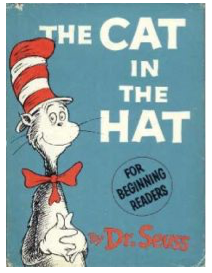
I flipped through the first few books we were given, unable to string even one sentence together. I watched as Red, my older sister, picked one up and started to read. Why could others do things like reading and mathematics, and I couldn’t? What magic trick had they learned that I had missed?
In the end, what mattered most was that these books were given to us by my Grandma; that’s what made me want to learn to read.
Early reading: The Bobbsey Twins, Nancy Drew, and Tom Swift
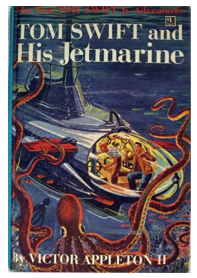 What are the odds of having two sets of fraternal twins in one family (Nan and Bert, Flossie and Eddie)?
What are the odds of having two sets of fraternal twins in one family (Nan and Bert, Flossie and Eddie)?
Having grown up when boys played with guns and girls played with dolls, the Nancy Drew’s were Red’s, the Tom Swifts’ mine (never a Hardy Boy myself). That, of course, didn’t stop me from reading a Nancy Drew or two.
Tom Swift was the brother I never had, with a father who nurtured his interests and a best friend that followed dutifully along; stories read behind a closed door, in my bed, safe in my room.
Robinson Crusoe by Daniel Defoe
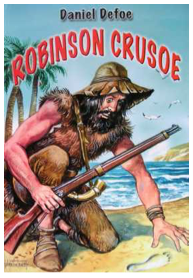 As a young kid I identified with this shipwrecked and safely washed-ashore character. Unbeknownst to me then, but now understood in reflection, it was the way I saw myself.
As a young kid I identified with this shipwrecked and safely washed-ashore character. Unbeknownst to me then, but now understood in reflection, it was the way I saw myself.
My bedroom, like Crusoe’s island, was surrounded by the turbulent sea of fights between Mom and Dad. It was a refuge from the chaos of life beyond the edges of my braided carpet.
Its simple narrative style struck at the heart of feeling alone in the world. Generally accepted as the first English novel, to this day Robinson Crusoe serves as a model for the prototypical castaway (think Cast Away or The Martian).
Toby Tyler or Ten weeks with a Circus by James Otis (James Otis Kaler)
 I can’t remember how or where I got my copy, but I still have it over forty-five years later—minus a few tattered pages. A new copy sits on one of my bookshelves, waiting for one of the kids to pick it up.
I can’t remember how or where I got my copy, but I still have it over forty-five years later—minus a few tattered pages. A new copy sits on one of my bookshelves, waiting for one of the kids to pick it up.
Like Toby, I too took to running away from a place where you didn’t feel loved (more than once) in search of a place to belong. It also introduced me to the circus, a home full of colorful characters and misfits; people who were outsiders like myself. That’s where I “found” my first monkey, which lead to my fascination with the monkey cage at McLeod’s (as described in Between the Ages).
Such is the power of writing, of reading, of going to places in your mind you can’t reach and yet, through your imagination, can live. Like Handcarved Coffins (see Capote, below) I’ve read Toby Tyler many times, hoping Mr. Stubbs (the monkey) wouldn’t climb the tree, wouldn’t get shot, and that Toby and Mr. Stubbs would live happily ever after.
As I Grew Older …
Used book stores became places I sought out. They had a selection, pr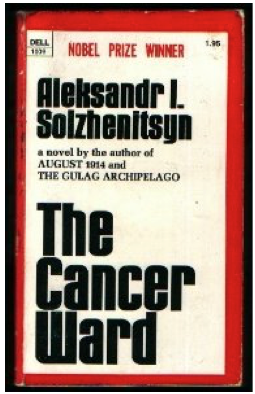 ice point, and consistent smell (somewhere between an old relative’s house and a musty basement) that welcomed me time and time again. I found a great one on the Queensway in Toronto, and in short order my bedroom adopted that same musty smell as I filled my own bookshelves.
ice point, and consistent smell (somewhere between an old relative’s house and a musty basement) that welcomed me time and time again. I found a great one on the Queensway in Toronto, and in short order my bedroom adopted that same musty smell as I filled my own bookshelves.
I was unguided in my reading and to this day never sure why I, as a young adult, would have picked up One Day in the Life of Ivan Denisovich, The Cancer Ward, or The Gulag Archipelago, but I did.
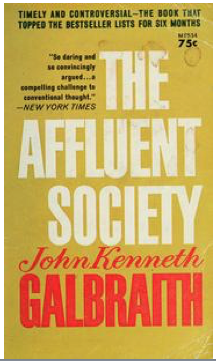 I learned what becomes important when there is nothing but getting through the day in front of you. Through Solzhenitsyn I understood how a piece of bread, a sock full of holes, or a used blanket can become the most valuable piece of currency one can have.
I learned what becomes important when there is nothing but getting through the day in front of you. Through Solzhenitsyn I understood how a piece of bread, a sock full of holes, or a used blanket can become the most valuable piece of currency one can have.
From there, I jumped to John Kenneth Galbraith and The New Industrial State; The Affluent Society; and The Great Crash, 1929. Books were now larger windows on politics, on government, on the way people willingly organized themselves (not always to the betterment of their condition).
Georges Simenon (take your pick from over 400 books)
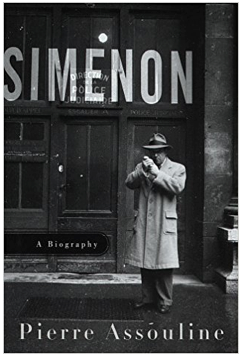 Georges Simenon was ahead of his time on the business side of writing, a tormentor of women in his personal relationships, and a writer with the ability to crank out as many books his audience would buy. At one time, a model for the idealized writer I had hoped to be become.
Georges Simenon was ahead of his time on the business side of writing, a tormentor of women in his personal relationships, and a writer with the ability to crank out as many books his audience would buy. At one time, a model for the idealized writer I had hoped to be become.
Many a flight was made with an Inspector Maigret novel as my companion. Besides writing deceptively simple plots, Simenon’s stories required little attention. Add to that his acute business sense in having his publishing rights revert back to him, he alerted me to the dichotomy of writing: the creative side (which most writers understand) and the business side (which most, I would say, do not).
If you read nothing other than his biography, read Pierre Assouline’s. Simenon had one of those lives worth living, through which an aspiring author could at least catch a glimpse.
His stories, along with my then developing interest in French cinema, made me want to visit France—something I didn’t do until later in life. The simplicity of hopping on a plane and walking the streets of Paris (a short seven hours away) never dawned on me until one Alison Webb pushed me gently in that direction. Thank you for Paris, Alison. May you rest in peace.
Passage to Juneau: A Sea and Its Meanings by Jonathan Raban
As a landlubber who bought a sailboat and left it in dry-dock for several years because, like Raban, I too was “afraid of the sea,” Passage to Juneau presented a journey of escape without having to leave the safety of land.
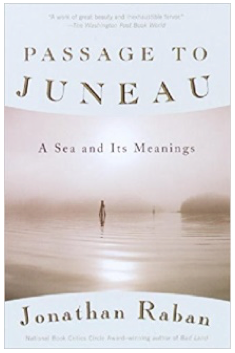 A road trip on many levels, Raban navigates both the historical Inside Passage of the Pacific Coast, reflecting on the Indigenous people who lived along the edge of the shore as he sailed up to Juneau, and his personal life.
A road trip on many levels, Raban navigates both the historical Inside Passage of the Pacific Coast, reflecting on the Indigenous people who lived along the edge of the shore as he sailed up to Juneau, and his personal life.
Through Raban one can “touch down” into that damp, west coast environment, smell the pine and hemlock, and feel the moist, wet moss—all of which provide a fleeting kinship with the Haida way of life he describes.
In detailing his relationships with his father (difficult, as was mine) and his wife (separate, like mine at the time), I didn’t see the end coming. Carried away on the journey as I was, I missed the “sign posts” along the way; an apt metaphor on how the passing of one’s life isn’t always clear until a part of the journey has abruptly ended.
Passage to Juneau is the one book I’ve most often given away as a gift; but only after hearing the wind blow through the words of comparable souls.
Gumshoe: Reflections in a Private Eye by Josiah Thompson
I read a positive review in a Canadian magazine, and was intrigued by two things. The first was a reference to Kierkegaard, or rather Kierkegaard’s notion of “the idle onlooker.” Having found myself feeling like I was on the outside of my life looking in it was a notion that spoke to me, whether I fully understood what was being expressed or not.
Having decided Kierkegaard might have some answers I turned to his biography, as well as his work. I read in him the same depression and feelings of de-realization, sadness, and of lack of control I had over my own life. It would take a lot longer to understand one takes control of life, not the other way around.
The second thing that intrigued me was Thompson’s willingness to take a sabbatical (and eventually give up tenure), and move across the country to try a new vocation.
I couldn’t find the book locally, so I called up the author and got Josiah Thompson himself on the phone, direct from his detective office in San Francisco. Too excited to say much other than I was from Canada and wanted to buy the book, Thompson was gracious enough to talk for a few minutes and provide a phone number for a “young lady in Toronto” who would steer me in the right direction.
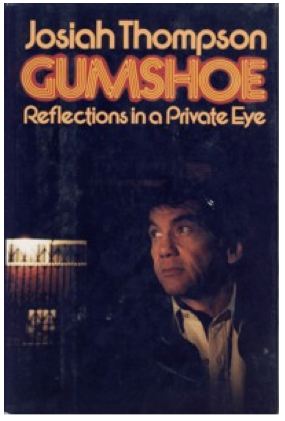 One of the most important lessons I took away from Gumshoe was that when things in life aren’t happening as you’d like his advice was to “not to push a case,” and step back and let the case come to you. It’s a principal I’ve tried to apply when life isn’t working: to not force a relationship or issue, but let it come to you.
One of the most important lessons I took away from Gumshoe was that when things in life aren’t happening as you’d like his advice was to “not to push a case,” and step back and let the case come to you. It’s a principal I’ve tried to apply when life isn’t working: to not force a relationship or issue, but let it come to you.
More importantly, Thompson opened my eyes to Chandler and Hammett. I’d loved Noir since the first black–and-white detective movies I watched in our cool, dark basement on hot summer days. I just didn’t know back then from whose pages many of those scripts had come. Thompson brought that to me.
Then came Capote…
Where to start? At the beginning. Other Voices, Other Rooms, Capote’s first published novel. Before I read the book, he for me just was a short, queerish speaking man I’d seen on TV.
Other Voices, Other Rooms opened a world far different than mine, yet I felt an empathy with the young protagonist of the novel, Joel Harrison Knox. Our kinship was in our alienation, loneliness, abandonment, and search for identity. Getting a feel for Joel’s search for his father, “a father who, in the deepest sense, was nonexistent,” spoke to me as well, having made up my own imaginary biological father as a child.
What I admired was Capote’s courage to be whatever he might be, from an early age. I’ve been on that journey ever since. Of all the authors, his influence, along with Carver, Murakami, and King (all for different reasons; see On Writing) has been the biggest.
Music for Chameleons (including “Handcarved Coffins) by Truman Capote
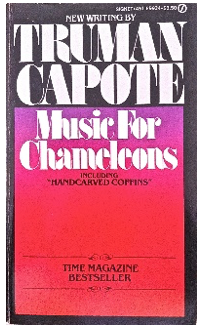 I’ve read the whole book, cover to cover, only once.
I’ve read the whole book, cover to cover, only once.
It was, and continues to be, the novella in the middle, Handcarved Coffins, that I read over and over, hoping each time the ending (such as it is) will be different. I want Jake and Addie (spoiler alert) to live happily ever after. But they don’t.
That is, to me, the hallmark of a good story. One written well enough to read again and again with the hope that somehow, this time, the ending might be different while knowing it never can be.
To Kill a Mocking Bird by Harper Lee
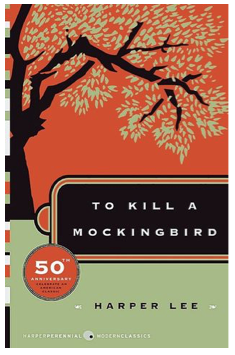 A model of simplicity in its ability to convey meaning through the observations of a child-like character.
A model of simplicity in its ability to convey meaning through the observations of a child-like character.
Having read it late in life (thank God), it made me wonder why in the hell I even thought I could write anything worth reading.
After a funk lasting several days I decided to read about Harper Lee the person, and the writer. Once I understand the frustration, time, and effort that went into the book I decided that while I may never write something as solid (not a word out of place), I could at least subscribe to the principle of trying to write this well.
In Closing…
There’s something like a million books published every year (don’t quote me), and I’m fully aware I’m limited in what I’ve read. I also know reading every day, while knowing you’ll never scratch the surface of what’s been written, is still a worthwhile effort. Read on.